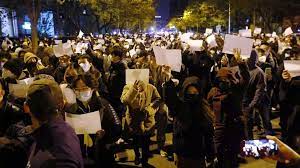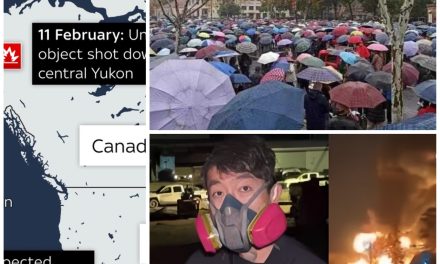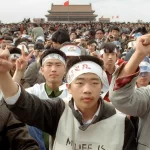By JIANLI YANG
T he sixth plenary session of the 19th Chinese Communist Party (CCP) Central Committee is to be held on Nov. 8, 2021. The plenary session’s much-anticipated focus is the consideration and adoption of the “Resolution of the CCP Central Committee on the Major Achievements and Historical Experiences of the Party’s Centennial Struggle.” Judging from the title, this historical resolution mainly centers around the achievements of the party’s century-long struggle. And, based on a summary of the major achievements and struggles of the CCP’s 100-year-long history, the “historical patterns” of the CCP’s rule are identified and will be used to guide the next 100 years of their rule.
he sixth plenary session of the 19th Chinese Communist Party (CCP) Central Committee is to be held on Nov. 8, 2021. The plenary session’s much-anticipated focus is the consideration and adoption of the “Resolution of the CCP Central Committee on the Major Achievements and Historical Experiences of the Party’s Centennial Struggle.” Judging from the title, this historical resolution mainly centers around the achievements of the party’s century-long struggle. And, based on a summary of the major achievements and struggles of the CCP’s 100-year-long history, the “historical patterns” of the CCP’s rule are identified and will be used to guide the next 100 years of their rule.
This will be the third historical resolution in the history of the Chinese Communist Party.
The first two were the “Resolution on Certain Questions in the History of Our Party,” adopted at the sixth plenary session of the seventh Central Committee of the CCP in 1945; and the “Resolution on Certain Historical Questions Since the Founding of the Nation,” adopted at the sixth plenary session of the 11th Central Committee of the CCP in 1981.
The first historical resolution summarized the successive “mass line struggles” that occurred since the founding of the Chinese Communist Party, especially the successive line struggles that took place during the historical period between the July 15 incident in 1927 and 1945, establishing the revolutionary leadership of Mao Zedong. The second historical resolution was led by Deng Xiaoping, who, shortly after his comeback, displaced Mao’s designated successor Hua Guofeng. This resolution provided an empirical summary of the successive ideological and political movements and line struggles during the period from the founding of the People’s Republic of China (PRC) to the end of the Cultural Revolution in 1976, focusing on the 10-year Cultural Revolution, as well as offering a re-evaluation of the first three decades post the founding of the PRC.
The resolution not only criticized Mao Zedong, who was mainly responsible for launching the Cultural Revolution, but also completely renounced the Cultural Revolution itself. Mao was given a scorecard of 70/100; he was deemed to be 70 percent praiseworthy, and only 30 percent at fault. Deng Xiaoping was unable to fully denounce Mao as Soviet Communist Party Secretary Nikita Khrushchev had done to Stalin; Deng’s reserved attitude toward Mao served to promote the legitimacy of the CCP as well as the practical need of Deng’s succession to become the CCP’s supreme leader at the time. Khrushchev’s repudiation of Stalin would not have done much damage to the legitimacy of the Soviet Communist Party, because the Soviet Communist Party still had Vladimir Lenin as its main source of legitimacy, whereas Mao was a principal founder of the CCP, and the party was largely built under his leadership. Additionally, Deng was an important member of the first generation of the Communist Party leadership and also a close comrade of Mao for a larger part of Mao’s time, so denying Mao’s legitimacy naturally would also have denied him the legitimacy needed to take over as supreme leader. Deng Xiaoping made this historical resolution to criticize the leftist (Maoist) forces within the CCP, represented by Hua Guofeng, in order to secure his own political power and position.
It seems that the Chinese Communist Party values historical experience more than any other political party, and successive CCP leaders have been adept at twisting history to their own advantage. The reason that Xi Jinping wants to discuss historical resolutions at the sixth plenary session is to further consolidate and strengthen his own historical position, clearing away ideological and theoretical interference and laying down historical legitimacy to remain in power (by breaking the CCP’s decades old norm of succession of power) following the 20th National Party Congress, which is expected to be held in the second half of 2022. Xi chose the 100th anniversary of the CCP’s founding as a symbol of carrying on the historical status of Mao Zedong and Deng Xiaoping as the leadership looks ahead to the next 100 years of the Chinese Communist Party.
In light of Xi’s current power and control over the CCP, even without a third historical resolution, no one will be able to stop him from staying as the CCP’s top leader at the 20th National Congress, unless something unusual and unexpected happens in the coming year. But from Xi’s point of view, this document is essential.
If the first two historical resolutions, both of which occurred at turning points in the CCP’s history, were valuable from the CCP’s perspective (insofar as they established the leadership of Mao and Deng, respectively, and allowed the CCP to enter a new and prosperous stage of development), then it seems that the third historical resolution is also made at a critical point in history. But, is the party turning to good fortune or hardship? It is Xi Jinping himself who has caused this quandary, and there is great uncertainty as to whether the CCP will be able to extricate itself from this predicament.
Xi Jinping is certainly facing inner turmoil over this issue.
Considering the harsh external environment, internal turmoil, as well as the difficulties and challenges facing China’s economy, Xi Jinping urgently needs to consider how to further consolidate power and centralize and unify the leadership. In particular, as the 20th National Congress approaches, Xi inwardly knows that although no one in the CCP is making noise, everyone is privately questioning why he is undermining the party’s decades-old system of orderly succession of top leaders. He needs to give the party, as a whole, a justifiable explanation. Granted, Xi could conceivably ignore such questions without jeopardizing his “re-election.” However, this would undoubtedly undermine Xi’s authority and image among his skeptics, who are not a minority and are, in fact, part of the elite within the Communist Party, and whom Xi relies on to execute his ideology, implement his instructions and rule China.
Xi Jinping needs to reinforce the existing narrative of “Xi Jinping’s New Era.” Although he is responsible for the CCP’s current predicament, he can also exploit the radical nationalist sentiment of the masses to convey to the party that the current difficulties are temporary; and that through his ideas and leadership, the CCP will overcome the difficulties it faces and attain further glory, ultimately achieving the second of China’s two centennial goals. He did not simply give the party false hope. Since the party was able to eradicate poverty and build a moderately prosperous society under Xi’s leadership within 100 years of the founding of the CCP, he could, given sufficient time, help make China the world’s most powerful country and achieve “common prosperity” by 2050. This will be the choice of history. And it will be the mandate for his “re-election” at the 20th Congress.
It is no coincidence that Xi Jinping chose the 100th anniversary of the CCP’s founding to make his third historical resolution, and to discuss his “new era” and its achievements. He did so in order to further consolidate and strengthen his historical status and role, and to make the entire CCP realize that Xi—and Xi alone—is the leader. In other words, Xi wants to use this third historical resolution to highlight the legitimacy and aptness of history’s choice to confer power upon the CCP and himself.
This article first appeared in Newsweek on 10/29/21


















